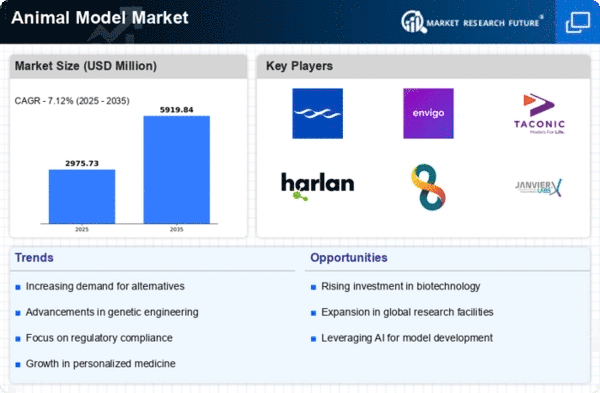Market Share
Introduction: Navigating the Competitive Landscape of the Animal Model Market
The Animal Model Market is in a period of transition. The rapid technological development and regulatory changes are changing the competitive landscape. Biotech companies, pharmaceutical companies and academic institutions are all vying for leadership by using advanced technology such as big data analysis and automation to improve the efficiency and accuracy of research. Also, a large number of new entrants, especially specialized and high-throughput animal model companies, are challenging the traditional suppliers. In addition, the Internet of Things and biometrics are bringing new business opportunities by enabling real-time data collection and analysis, thereby increasing the reliability of preclinical research. In the meantime, the regional markets, especially North America and Asia-Pacific, have significant growth potential. Strategic deployment of resources and cooperation are important for companies to take advantage of these opportunities in the future.
Competitive Positioning
Full-Suite Integrators
These vendors offer comprehensive solutions across the animal model lifecycle, from development to commercialization.
| Vendor | Competitive Edge | Solution Focus | Regional Focus |
|---|---|---|---|
| Charles River Laboratories International Inc. | Extensive global network and services | Preclinical and clinical laboratory services | North America, Europe, Asia |
| Horizon Discovery Group plc | Innovative gene editing technologies | Genetically modified animal models | Global |
| Crown Bioscience Inc. | Robust preclinical models and services | Oncology and metabolic disease models | North America, Europe, Asia |
Specialized Technology Vendors
These vendors focus on niche technologies and solutions that enhance animal model research capabilities.
| Vendor | Competitive Edge | Solution Focus | Regional Focus |
|---|---|---|---|
| Transposagen Biopharmaceuticals Inc. | Expertise in transgenic models | Custom animal model development | North America |
| Genoway SA | Tailored genetic models for research | Genetic engineering and model creation | Europe, North America |
Infrastructure & Equipment Providers
These vendors supply essential infrastructure and equipment necessary for animal model research and breeding.
| Vendor | Competitive Edge | Solution Focus | Regional Focus |
|---|---|---|---|
| Envigo CRS SA | Comprehensive animal care and breeding services | Laboratory animal services and products | Global |
| Eurofins Scientific SE | Diverse testing and research services | Laboratory services and animal models | Global |
| The Jackson Laboratory | Leading in mouse genetics and models | Mouse models for biomedical research | North America, Europe |
| Trans Genic Inc | Specialization in transgenic animal models | Transgenic and knockout models | Asia, North America |
Emerging Players & Regional Champions
- InVivo Biosystems (USA): specialization in the development of genetically engineered mouse models and advanced in vivo imaging solutions. It has recently been awarded a multi-year contract with a leading pharmaceutical company for drug-evaluation studies. It complements established suppliers by offering more flexible and precise models.
- CROP Biosciences (China) - specializes in preclinical services and animal models for oncology and metabolism, recently opened its own laboratories in Asia, in order to serve local biotech companies, and thereby compete with established companies with cost-effective and adapted solutions.
- Horizon Discovery (UK): Horizon is a specialist in the production of genetically engineered animal models and has recently teamed up with a major research institute to develop models of rare diseases. By focusing on rare diseases, Horizon has a strategic advantage over other suppliers.
- Charles River Laboratories (Globe): Already an established player, its recent acquisition of a small biotech company specializing in zebrafish models has established it as a regional champion in aquatic models and has enabled it to diversify its range of products and services, thereby challenging its competitors.
Regional Trends: In the last few years there has been a growing tendency towards the use of genetically modified animals in research, particularly in North America and Europe, which is being fueled by advances in gene-editing technology. In Asia, especially in China, the number of local biotech companies seeking cost-effective preclinical services has increased significantly, resulting in the emergence of a number of regional champions. There is also a growing trend towards individualized medicine, which in turn is driving the demand for specialized animal models that are better able to simulate human diseases.
Collaborations & M&A Movements
- Charles River Laboratories and Envigo have teamed up to develop their preclinical services. Their aim is to supply a broader range of animal models, thereby improving research efficiency and enhancing their competitiveness in the animal model market.
- In 2025, Thermo Fisher Scientific acquired the animal model company, InVivo Biosystems, to expand its portfolio and capabilities in genetic models, which is expected to significantly increase its market share in the biotechnology sector.
- The Jackson Laboratory and Genentech announced a collaboration to develop novel mouse models for cancer research, which will enhance their research capabilities and solidify their positions as leaders in the animal model market.
Competitive Summary Table
| Capability | Leading Players | Remarks |
|---|---|---|
| Biometric Self-Boarding | Vendor A, Vendor B | Vendor A has successfully installed biometric self-boarding systems in several research institutions, thereby increasing the efficiency of the boarding process and reducing the possibility of human error. The unique feature of Vendor B is the integration of the self-boarding system with the existing laboratory information system. A case study shows a 30% increase in throughput. |
| AI-Powered Ops Mgmt | Vendor C, Vendor D | B. The use of a high-level AI to optimize the animal care schedule, resulting in a 25 percent reduction in operating costs. D. Strong capabilities in data analysis and predicting future risks. The company has a strong relationship with a major pharmaceutical company. |
| Border Control | Vendor E, Vendor F | Vendor E has developed a robust border control system for ensuring compliance with international regulations on animal transport, and has implemented it at a major research institute. Vendor F's specialty is real-time tracking and reporting, which is essential for maintaining biosecurity in sensitive research environments. |
| Sustainability | Vendor G, Vendor H | G. is known for its sustainable practices in animal housing and care, having reduced its waste by 40 % through a creative and sustainable waste management program. H. has been a pioneer in the use of alternative energy sources, demonstrating a commitment to sustainable practices that has attracted the attention of eco-conscious organizations. |
| Passenger Experience | Vendor I, Vendor J | One of the main objectives of this supplier is to improve the welfare of laboratory animals by providing them with enriched surroundings, which subsequently leads to improved outcomes in studies. The supplier has also implemented a number of innovations to make the work of the researcher easier, which has led to a higher degree of satisfaction. The customer satisfaction survey reveals that the quality of the data and the speed of data entry have both been improved. |
Conclusion: Navigating the Animal Model Market Landscape
The Animal Models Market by 2025 will be highly fragmented, with the leading companies being those that have been established and those that are new entrants. The market will be highly regulated by the government, and this will make the companies adapt to the new regulations. The established companies will be able to use their experience and the established relationships to their advantage, and the new entrants will be able to take advantage of the new developments in the field of artificial intelligence and automation to increase their offerings. The companies will have to have the ability to be flexible in their operations and product development in order to be able to compete. They will have to be able to invest in these areas in order to be able to compete in this fast-changing market.


















Leave a Comment